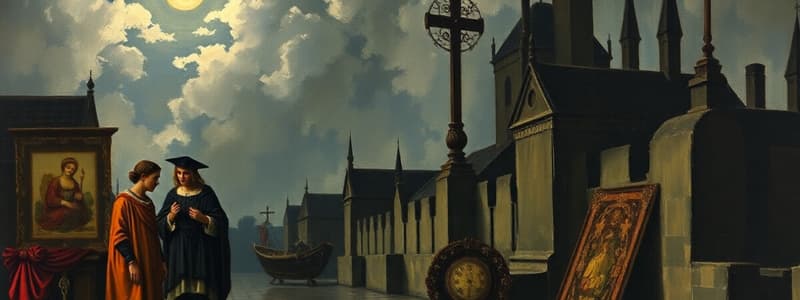Podcast
Questions and Answers
What major action did Pope Leo X take that led to financial troubles for the Vatican?
What major action did Pope Leo X take that led to financial troubles for the Vatican?
- Increasing taxes on church donations
- Investing in military campaigns
- Hosting extravagant parties (correct)
- Selling church land to raise funds
What was a significant outcome of Martin Luther's 95 Theses?
What was a significant outcome of Martin Luther's 95 Theses?
- Martin Luther becoming Pope
- The establishment of Lutheranism as a major sect (correct)
- The immediate reform of the Catholic Church
- The immediate cessation of indulgences
Which threat posed a political risk to Charles V, despite being a Catholic power?
Which threat posed a political risk to Charles V, despite being a Catholic power?
- The Ottoman Empire
- The Protestant Reformation
- Frederick III's influence in Saxony
- The Kingdom of France (correct)
What strategy did Pope Clement VII employ to address the financial issues of the papacy?
What strategy did Pope Clement VII employ to address the financial issues of the papacy?
In what year did the Diet of Worms take place, where Martin Luther was defended?
In what year did the Diet of Worms take place, where Martin Luther was defended?
What impact did the major events like famine, plague, and war in the 14th century have on people's faith?
What impact did the major events like famine, plague, and war in the 14th century have on people's faith?
Which family capitalized significantly on the financial vacuum left by the plague?
Which family capitalized significantly on the financial vacuum left by the plague?
What was a common belief about the fate of priests during the crises of the 14th century?
What was a common belief about the fate of priests during the crises of the 14th century?
How did the mindset of enjoying life develop during the Renaissance period?
How did the mindset of enjoying life develop during the Renaissance period?
Which alliance was formed by Lutheran princes in response to persecution from Charles V?
Which alliance was formed by Lutheran princes in response to persecution from Charles V?
Study Notes
14th Century Europe
- The 14th century in Europe was marked by devastating events such as widespread famine, plague, war, and rebellions.
- These events resulted in the death of over 50% of the European population.
- The aftermath of these disasters had a profound impact on survivors' faith.
Faith in the Face of Tragedy
- Survivors grappled with questions of faith and mortality, questioning the nature of God and His role in the suffering.
- Some survivors found solace in strengthened faith, believing they were chosen by God to survive.
- Others experienced weakened faith, questioning the goodness of a God who allowed so much suffering.
- The deaths of many priests, who were considered highly pious, further challenged faith, leading some to question the validity of their own piety.
Rise of Individualism
- The hardships of the 14th century fostered a sense of individualism and a desire to enjoy life, as survivors recognized the fragility of existence.
- This emphasis on individual experience laid the groundwork for the Renaissance, a period of cultural and artistic flourish.
- Renewed interest in classical civilizations, like Greece and Rome, which emphasized the enjoyment of life, also contributed to the changing intellectual landscape.
The Medici Family
- The Medici family, a wealthy and powerful Italian family, emerged as major players in the aftermath of the plague.
- Their financial dominance and ostentatious display of wealth exemplified the burgeoning Renaissance spirit.
Martin Luther and the Protestant Reformation
- Martin Luther, a German priest, played a pivotal role in the Protestant Reformation.
- Disgusted by the corruption he witnessed in the Catholic Church, Luther published the 95 Theses, a critical document that sparked a movement for religious reform.
- The widespread use of Gutenberg's printing press allowed Luther's ideas to spread rapidly.
The Role of the Church
- Pope Leo X, a Medici, was known for his extravagance and lavish lifestyle.
- He was considered corrupt and ultimately bankrupted the Vatican.
- Pope Clement VII, Leo X's cousin, implemented a scheme to raise funds by selling indulgences, essentially "get-into-heaven-free cards."
The Holy Roman Empire and its Conflicts
- Charles V, the Habsburg King of Spain, inherited the Holy Roman Empire in 1519, becoming one of the most powerful rulers in Europe.
- His vast empire faced threats from both France, a political rival, and the Ottoman Empire, a military powerhouse.
- The rise of Protestantism within the Holy Roman Empire led to conflict with Charles V, who actively persecuted Lutherans.
- An alliance of Protestant princes, known as the Schmalkaldic League, formed to resist Charles V's suppression of their faith.
The Sack of Rome
- In 1527, Charles V's soldiers, disgruntled over lack of payment, mutinied and sacked Rome, the holy city of the Catholic Church.
- Pope Clement VII barely escaped with his life.
- Clement VII blamed Charles V for the sacking and declared war, aligning with France through the marriage of Henry II of France and Catherine de Medici.
The Impact of the Renaissance
- The Renaissance, driven by the changing social, economic, and religious landscape, marked a period of rebirth in Europe.
- The challenges of the 14th century and the emergent humanist ideals inspired new scientific discoveries, artistic expressions, and intellectual pursuits.
Studying That Suits You
Use AI to generate personalized quizzes and flashcards to suit your learning preferences.
Description
Explore the tumultuous events of 14th century Europe, marked by famine, plague, and war, leading to a drastic decline in population. This quiz delves into how survivors confronted questions about faith and mortality amidst tragedy, and how these struggles fostered a rise in individualism. Understand the profound impact these events had on European society and spirituality.




